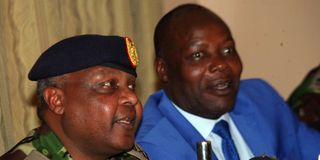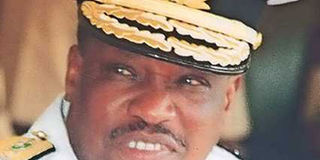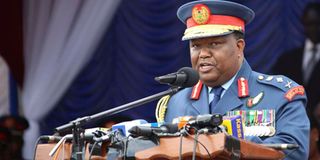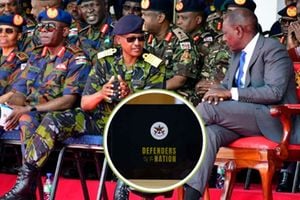
Kenya Defence Forces (KDF) spokesperson Bogita Ongeri.
Strategic communications was a concept of the unknown future when Bogita Ongeri assumed office as Kenya Defence Forces (KDF) spokesperson 25 years ago.
What was in place then was a mentality that the military didn’t need such a person to do its business.
This is illustrated by an early conversation Ongeri had with a well-meaning colleague when he was posted to Defence Headquarters from the then Ministry of Information and Broadcasting.
“So, Bogita, what work have you come to do here at DoD?” Ongeri told him he had been instructed by the then Director of Information to go and assist the military in public relations.
The man laughed: “Do soldiers really require PR to kill?”
This gentleman was not being callous. He sincerely believed that winning hearts and minds wasn’t a soldier’s business.
His institution was schooled to this point of view. Ongeri had waded into what was practically a secret organisation whose actions were to be seen and not spoken about.
The military’s basic instinct was suspicion; civilians, especially those irredeemably nosy journalists, were to be treated with uttermost caution. They could be spies. He found an institution that had appropriated to itself the concept of patriotism and judged everybody else as either totally lacking in it or inclined to do so. First day in school was a tough one for him.

Vice Chief of Defence Forces Lt General Joseph Kasaon (left) and KDF spokesperson Bogita Ongeri addressing journalists in Nairobi on September 14, 2015
One person, however, did not share this view – the boss himself.
General Daudi Tonje, then Chief of the General Staff, saw the military as a national asset that had to be accountable to the public and, therefore, needed to communicate its operations to the taxpayer as long as that did not have negative security implications. Thus begun the transformation of military communications in the country.
“Upon completion of my university studies, I ended up being a career civil servant,” says Ongeri. “I was recruited and posted to the Ministry of Information and Broadcasting where I worked for six years. I was later posted to the Ministry of Defence at the request of Gen Tonje. It was his desire to inject professionalism in defence communications which at that time was being handled by military education officers.”
He started the task single-handedly and worked like that for a long time. It was not until 2005 that the first three graduates were selected, underwent training and commissioned to support strategic communications. The trio injected new blood into KDF’s communication strategy to the level of coming up with a state-of-the-art broadcast studio that airs the ministry’s news in its weekly bulletin. By the time he left, the Strategic Communications Branch was headed by an officer of the rank of Brigadier. It currently has a seasoned team of professionals, both civilian and military with knowledge, expertise and experience to sustain the image of the ministry.
Ongeri spoke for seven Chiefs of the Defence Forces – Generals Tonje, Joseph Kibwana, Jeremiah Kianga, Julius Karangi, Samson Mwathethe, Robert Kibochi and the late Francis Ogolla.

Gen (Rtd) Joseph Kibwana.
He found them both different and the same. Each had a distinct personality which they brought into office and took away with them when they left. Their similarities could make you trade one for the other and get the same results. To reach the level of four-star General, one must climb a ladder of 10 steps. From the lowest, these steps, or ranks, are second lieutenant, lieutenant, captain, major, lieutenant colonel, colonel, brigadier, major general, lieutenant general and finally general.
Not less than 35 years of one’s life is spent doing this painstaking climb and only a few select scale the top. Not one rank can be jumped. They join the military barely out of their teens and leave it as grandparents. This makes them the same in a number of ways especially in their commitment to institutional stability. All the chiefs are custodians of a military culture that prizes stability and predictability while constantly reading the future.
“You may think that Kenyan generals are from the same mother and father due to the shared legacy and dream about the defence and protection of the republic,” says Ongeri. “These are the people I love most after my family. They hold principles that form the bedrock of our national security architecture. This applies not only to those who have served as CDF but also to all generals in the KDF. To them, the night is to see the dreams where KDF shall be in the next century, the day is to make them come true.”
It is in the execution of this vision that the differences in the personalities of the chiefs became most fascinating to Ongeri. How each went about their work was hardly ever a question of right or wrong, just different. He had an early close-up view of the self-assurance of the man who gave him his job. One of the telephones on Gen Tonje’s desk was a direct line to the President and Ongeri knew it. Once, while in a meeting with the General, it rung. Ongeri respectfully rose to leave the room to allow the CGS the confidentiality he thought he needed to speak to his Commander-in-Chief. But with a wave of the hand, Tonje motioned him to remain seated and he thus became privy to the conversation.
It turned out that President Daniel arap Moi had telephoned to instruct General Tonje to provide a Kenyan Air Force plane to fly members of parliament to Arusha, Tanzania, for a football match.
The team, Bunge FC, was participating in the East African Parliamentarians football tournament, an annual event.
With that sonorous voice of his, Tonje told his boss: “No, Your Excellency, all the Air Force planes are fully engaged. It is not possible for us to fly the team to Arusha.”
The conversation was brief and Tonje had his way; the MPs had to find other means to go to Arusha. Ongeri took away two things from this conversation: one, that Gen Tonje owned his space. Respectful as he was to his Commander-in-Chief, he wasn’t about to get railroaded into disrupting critical tasks over something that was clearly neither security-related nor a civil emergency.
The second thing Ongeri took away was that President Moi was big enough to take ‘no’ for an answer from his subordinate. This was extraordinary. That he had the grace to take back his instruction rather than order Gen Tonje to make it happen was a credit to him and it belied his public reputation. In Ongeri’s opinion, both C-in-C and CGS comported themselves quite well. But he reserved his highest admiration for his boss. He was awestruck and very proud of Gen Tonje. He had always admired his intellect and vision but now his admiration for the artillery general left ground and reached the stratosphere.
“General Tonje was a true thinker and intellectual par excellence who knew how to translate a vision into reality and that education is the mother of leadership,” Ongeri now says. “He believed that leadership and learning were indispensable to each other and that a good leader must mentor, coach, train and equip others and leave the stage for them to take over.”
Another of the generals who made a lasting impression on Ongeri was Julius Karangi from the Kenya Air Force. Wanting a change after years at Defence, the now veteran spokesperson wanted out and managed to get himself transferred to the Ministry of Education. He was within five months of his posting when Karangi ascended to the helm of KDF. Over his pleas that he was happy at Education, Karangi yanked him back to Defence, saying he needed him.
“I found Gen Karangi incredibly bright as an objective thinker and strategist,” says Ongeri. “He had high leadership qualities and it didn’t surprise me that he had managed to become CDF. He wasn’t afraid to make bold decisions and live with the consequences. Some people found him to be self-opinionated but he could out-argue them all especially because he was well read. He won public praise for the successful military operation against al Shabaab in Somalia under Operation Linda Nchi. Gen Karangi recognised the power of the media and endeavoured never to lose face or prestige for our country.

Chief of Defence Forces (CDF) Gen Julius Karangi speaking during his handover ceremony at Department of Defence in Nairobi on May 4, 2015.
“He embed journalists at the war front. During press conferences, he had a deft hand at phrasing things with just the right blend of impact and substance. He was friendly, especially when dealing with the civilian staff. He is a man of humble disposition with mild manners and is also kind. He believed that things don’t just happen; they are made to happen. He is a general who made the civilian component, whom he jokingly called serikali (government) put their collective heart, soul and time into their jobs to deliver defence of the republic.”
In keeping with the essential nature of life itself, there were good days and bad days at the office and few as bad as the Westgate terror attack that resulted in the massacre of over 70 people, mostly civilians. Westgate happened on September 21, 2013 when masked gunmen stormed and seized the Westgate Mall in the Westlands suburb of Nairobi. The combined police and military forces deployed there worked at cross purposes, leading to the high casualty numbers. For its part, the media streamed the catastrophe live. This had the inadvertent effect of helping the terrorists to keep track of the goings-on outside. Since KDF was the lead urgency, they took most of the flak.
Ongeri says that heads didn’t roll so much as they got to work afterwards. There was a candid appraisal of what went wrong and the lasting lessons put in place included close multi-agency cooperation in the event of a repeat incident and more professional management of information going to the public. These lessons seem to have borne fruit during the DusitD2 terror attack of January 15, 2019. The tragic casualty list was much lower, 21 people.
“After Westgate, you could say we sweated a lot and that would be accurate,” he says.
Operation Okoa Maisha (Operation Save Lives) in Mt Elgon was another episode that left KDF’s name in tatters. Ongeri describes it as one of his most challenging times at Defence.
“The Mount Elgon insurgency was at its peak in 2005 and by 2008 the Sabaot Land Defence Forces, an ethnic militia was defeated,” he says. “The operation was successful as normalcy was restored but as a communication expert, I don’t hesitate to say we lost the war out of the way the media and some of the locals packaged the information. Evidence of our success can be witnessed today. Yet we are still saddled with reports about human rights abuses. We could have done better.”
Ongeri cultivated close relationships with journalists in Kenya to the extent that many came to regard him as one of their own.
By his own disclosure, he was able to get some stories killed after persuasively making a case to editors that publication would not be in the country’s security interest.
He attributes this to his training as a journalist, information scientist and para-military official.
He retained his bonds of friendship with journalists he studied with from his earliest days at the Kenya Institute of Mass Communication and those he picked up along the way.
He knew their culture, especially the deadlines they had to meet. He spoke their professional language, rather than government-speak.
He sought to be the authoritative source of information knowing the journalists would try and get it elsewhere if he stone-walled. And when there was nothing to report, he enjoyed socialising with them over a cup of tea.
“I was always aware that you cannot start a war with journalists and win,” he says. “You will just look like what I may call a stupid hardworking government official.”
But has he ever told lies on behalf of the government? His answer: “Public communication is all about transparency and accountability. But one must draw the line between classified information and that which is for public consumption. This calls for thorough training and vetting of those handling information in sensitive dockets like Defence.
“The nature and rigorous media and security training I underwent at home and abroad made me understand the expectations of my job. We could be friends with media personnel but when it came to issues of national interest, I was and still I am very firm. The advantage and privilege I have by virtue of my training is that I can tell in a glance classified or restricted information. In the course of my duty, I have never lied to the Kenyan citizenry but may accept to have dis-informed and misdirected enemies of the Republic on issues of national interest and security. In the circumstances a lie was kinder than the truth.”
The last Chief Ongeri spoke for was Gen Francis Ogolla.

The late Chief of Defence Forces, General Francis Ogolla.
Over the years they had formed such a warm relationship that they felt more like friends and colleagues and less like boss and subordinate. He found Gen Ogolla exceptionally empathetic; personal issues relating to his staff touched him. He saw this at first hand in the General’s reaction when he lost his mother. And Ogolla was clearly sad to see him leave service when his runout date arrived.
“We shall do everything to ensure that you’re okay,” Ogolla told him. Little did he know that he was only days away from bidding him an eternal goodbye. The general would soon perish in an air accident, the only chief to die in office in Kenya’s history.
All these experiences live inside him. So it is not a wonder that he speaks with the humility of the wise.
“The knowledge, experience and skills that I have acquired in my career in the public service and during my educational tours abroad have immensely contributed to my view of life and the world. These are assets I hope to share. I am able to understand fundamental truths about myself, the world in which I live and my relationship with it. I always pray to look at issues before me with the wisdom of King Solomon, the astuteness of Socrates and the kindness of Mother Theresa.”









